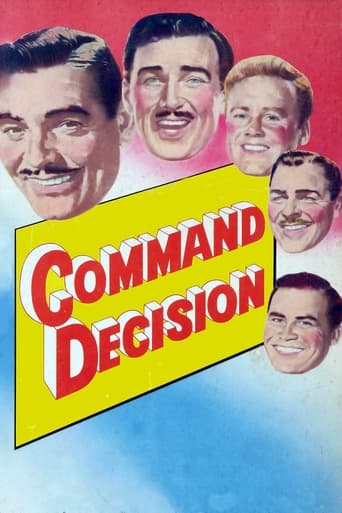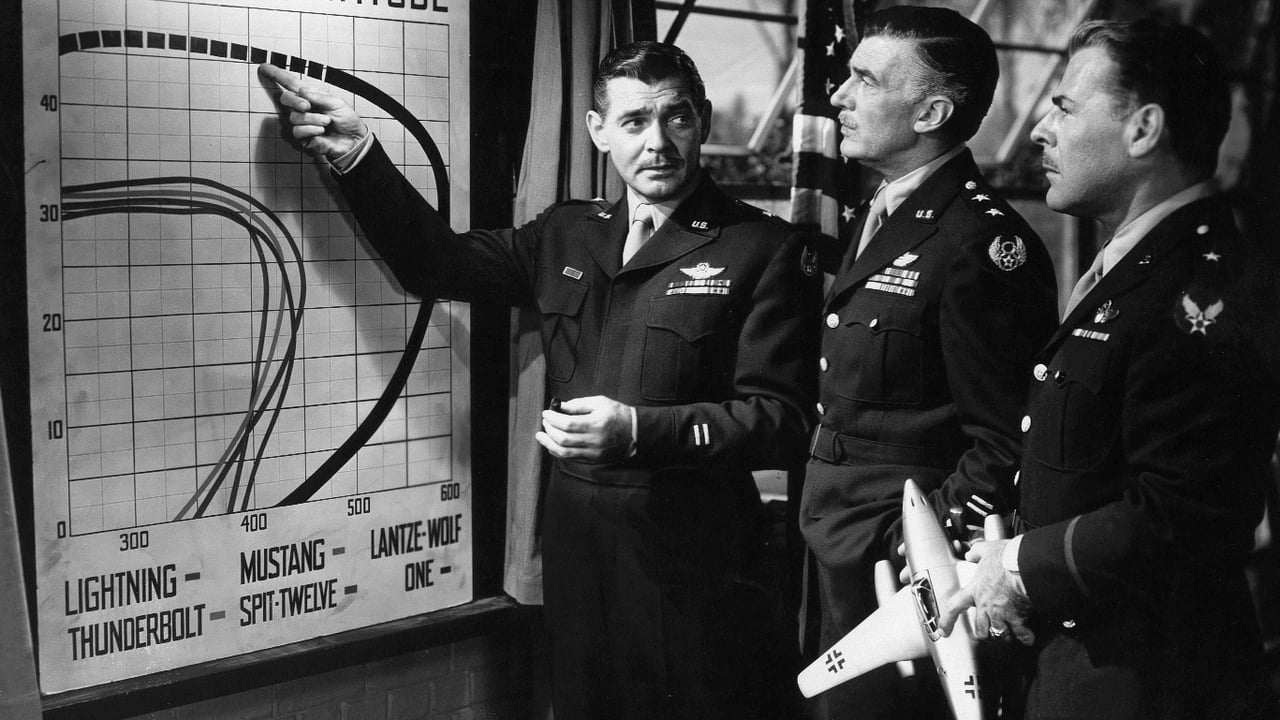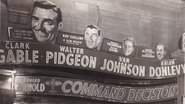robert-mulqueen
I watched "Command Decision" last night on TCM. It's the first time I've seen this film in over twenty years...perhaps longer. What struck me throughout this movie is the script. Some have complained that "Command Decision" was "too much like a stage play". Yes, it was adapted on Broadway from the stage play adaptation of a novel. The Broadway production ran for a year. Nonetheless, this film's attraction is both good work by the cast of A list Hollywood actors and, equally, a well written script which was intelligent and believable. In at least two instances, there are lengthy monologues -- one by Walter Pidgeon and one by Clark Gable -- which were book ended by rapid fire questions, responses, or comments. The script is outstanding.
dimplet
Reviewer kellyadmirer makes some good points about the historical inaccuracies in Command Decision. Germany didn't put jet planes into the air until near the end of the war. And they could have flown a heck of a lot faster than shown in the surveillance footage in CD. But CD doesn't claim to be non-fiction, and I have long since abandoned expectations of historical accuracy from any Hollywood film, even those claiming to be non-fiction. In CD, the target is jet fighter factories; in Twelve O'Clock High it is ball bearing factories. The point is not historical details such as this, but whether the film realistically depicts the events and time period. In this regard, CD is accurate, I assume, as is TOH. CD is somewhat cerebral, it is not so emotionally gripping. But then when you realize that Clark Gable actually flew bombing missions over Germany, it gives the film a whole new sense of reality. I viewed Dawn Patrol (1938), then Command Decision, and then TOH, which is also the order they were released. I would suggest other viewers do the same, as they are all on the same theme. CD is good, but TOH is the best, and so it is better to watch it last. But they each enhance the other by providing additional perspectives. (There is a fourth movie you should watch: Battle of Britain (1969), along with the BBC documentary on the subject. It is the most historically accurate, and is essential to understanding perhaps the most important battle of WWII, and the incredible bravery of WWII Allied aviators.)It is amusing comparing the style of CD and TOH. Even without seeing the credits, many viewers would recognize CD as an MGM film from its Hollywood style. TOH has a grittier, more realistic style. But in its defense, CD is set at a higher level of command, so the housing of these officers is a lot classier, which fits the MGM approach. However, I can't help wondering if CD was hurt by the somewhat formulaic film production approach at MGM. I see from IMDb that CD did not do well in its original release. Perhaps audiences wanted more action and less talking from a war movie. Ironically, TOH also has relatively little battle action. But I think CD has held up well over the years, and perhaps can be better appreciated by today's viewers precisely because it is not about battle scenes. It is about the human drama of having to make difficult life and death decisions, where you can be certain many under your command will die the next day, but if you don't take that course, many more will die later in the year. The calculus of war depicted in CD reminds me of Sergeant York, who finally decided killing was justified in war if it stopped the killing sooner, and resulted in fewer people dying. He killed because he wanted to stop the killing. Despite the inaccuracies, CD is right about the threat posed by German jet planes. I say "planes" because Hitler, strangely enough, didn't want to use jets for fighters! He felt fighters were defensive weapons, and he wanted to build offensive weapons, so he felt jets should be used for bombers, and for revenge on England. And he thought the war would be over sooner, so he initially rejected building jets. The British were offered design plans for jet planes before WWII began, with Power Jets beginning design in 1936. Some say the British military were slow to accept the idea, though not after the war began. The Gloster Meteor first flew in 1943, and entered combat in 1944.The German's Me 262 could accelerate to 530 mph, 93 mph faster than any Allied prop fighter. The Me 262's first test jet flight was in July 1942, in line with CD. But it didn't enter combat until April 1944. Did Allied bombing delay its manufacture, as depicted in CD? Actually, if Hitler had begun mass producing jet fighters earlier, as depicted in CD, Hitler might have won the war. By 1944, the Allies were building so many aircraft they had nearly complete dominance over European skies. But a German jet fighter could have been a serious threat.
Robert J. Maxwell
It's a little reminiscent of "Twelve O'Clock High," which came out at about the same time. Both focus on a commander who must order near-suicidal bombing missions in B-17s over Germany. Both examine the role of the commander who must sacrifice his men in pursuit of a loftier goal.But "Twelve O'clock High" is situated in an earlier stage of the bombing campaign against Germany, when there were simply not enough airplanes, and not the right kind, to do the job -- and the job was to prove the effectiveness of daylight precision bombing, as opposed to the British practice of night area bombing. It was a genuine historical issue. British losses were awful, and so were ours, leading to our suspension of daylight bombing until escort fighters were available.In "Command Decision", the period is later and incidents from the earlier period are mixed up with later problems. The issue now is not daylight precision bombing but the demolition of the factories in Schweinhaven and elsewhere (made-up names) that are producing a Messerschmidt jet that can out fly anything we have in the air. The new German airplane is given a name in this movie -- I forget exactly what it is, but it's something like "bomber shooter" -- that doesn't do the Luftwaffe credit for its imagination. In reality it was called "Die Schwalbe," the swallow. Nice irony, eh? The British and the Germans were always ahead of us when it came to nicknames. A swallow is a harmless bird. A B-24 was "a furniture van" to the Germans.Anyhow this movie, as good as it is -- and it's pretty good, focuses on command decisions, namely those made by General Clark Gable. He's forced to do what Gregory Peck does in "Twelve O'Clock High," bear down on his men and defy the higher-ups. The higher-ups are represented by visiting congressmen, including Edward Arnold, the eternal blow hard. There are other familiar stereotypical figures -- the wisecracking, all-knowing, down-to-earth sergeant (Van Johnson), the general from Washington who has his manhood squeezed in a vice between inexorable politics and his genuine desire to see the job done. Somebody's heroic nephew, all gung ho, who dies in the last raid after his son is born."Twelve O'Clock High" is probably a better movie, if only because it has a scene of combat at the end. This one is all stage bound. That's not necessarily bad, but it's treated as a platform for speeches. It's talky. "Why, Casey, do you realize how long I've fought for more bombers. Say, I backed bombing when it was a road to Siberia." That sort of thing.And there's another weakness. Only one person in this film changes -- Brian Donleavy as the general who replaces the fired Clark Gable. In "Twelve O'Clock High," Peck's general changes the entire outfit, even at the cost of his own sanity, and it's a pleasure to see the unit evolve.These weaknesses don't add up to that much. And, for anyone who wants to subject himself to the agony of thought, it's an instructive movie. Germany was an organized, territorial, uniformed opponent who had declared war on us and finally signed articles of surrender. The war ended -- with finality. The sacrifice of so many lives was not only justified, it was necessary. Is that reasoning still justified in a post-nuclear environment? What does the word "war" mean?
bkoganbing
Command Decision was adapted from a Broadway play that ran for 409 performances the previous year. Tony Awards were won by Paul Kelly who played General K.C. Dennis and James Whitmore for Tech Sergeant Emanuel Evans. The play shows the process of making military decisions when you have to factor in the politicians who control the purse strings. It's a necessary evil in a society that values civilian control of the military.Both during and after World War II there was a debate among the British and American air commanders over the value of daylight versus nighttime bombing attacks. The British did night raids over Germany, responding in kind to what the Luftwaffe had done to them. Fly over at high altitudes and just drop the bombs. It did make for fewer casualties among the RAF pilots of their Lancaster bombers.The Americans opted for daylight raids at a lower altitude trying to hit certain strategic objectives. In Command Decision it involves three factories that intelligence has learned are manufacturing new jet aircraft. If the Nazis had ever developed the far advanced jets against the Allied propeller aircraft in any number, the course of the war over Europe might have changed. Just like the V-2 rockets were developed too late to help the Axis cause.Command Decision has Clark Gable leading a distinguished cast as the general who has to make the decision about whether to bomb or not, to go into Germany's heartland without fighter escort. Unfortunately his purely military outlook is not shared by his immediate superior Walter Pidgeon who has to factor in the politicians in Congress who read the dispatches by correspondents like Charles Bickford here about the appalling losses in American life. In many ways Pidgeon has the most difficult part in the film. He has to take in the voices of objection raised by the visiting Congressional delegation led by Edward Arnold. Pidgeon is a politician, but purely by necessity. We admire Gable's stand on principle, but the audience also respects Pidgeon and sympathizes with him.On Broadway Command Decision takes place in the headquarters and to make it better for the screen, playwright William Wister Haines wrote an additional scene that Paul Kelly did not do on Broadway. Clark Gable on a radio microphone tries to talk down a bombardier who is piloting a plane where the pilot and co-pilot are wounded and killed. It's a harrowing scene and one of the best Clark Gable ever did. Gable must have drawn from his World War II experience, he was a tailgunner in our Army Air Corps and flew many a B-17 mission over Germany.Rounding out a distinguished group of MGM contractees are Van Johnson, Brian Donlevy, Marshall Thompson, Cameron Mitchell, Warner Anderson, Ray Collins, John McIntire and John Hodiak. They all cast well as Army Air Force personnel. Johnson plays the part that James Whitmore originated on stage and provides what little humor there is in this film.The main criticism of Command Decision has always been that it is too stagey. But I found it an absorbing account of the decision making process in a military command.



 AD
AD





